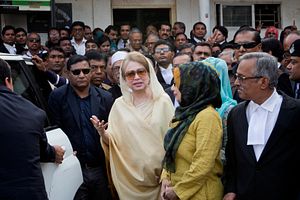Bangladesh’s democracy stands at a crossroads with the arrest and conviction of Khaleda Zia, chairman of Bangladesh Nationalist Party (BNP), the main opposition party. Zia, twice prime minister, was recently convicted by a Bangladeshi court and sentenced to five years in prison in a corruption case. Zia was accused of transferring 21 million taka ($252,200) from the Zia Orphanage Trust to her personal account from 2006 to 2008.
Her arrest has plunged the country into uncertainty, especially given that the verdict came down a week after the announcement that Bangladesh would hold a parliamentary election in December. Zia’s party is the only viable alternative to challenge the present government led by Sheikh Hasina of the Awami League (AL).
The conviction has led to widespread protests, as BNP cadres and other supporters have taken to the streets in Dhaka. BNP supporters have threatened to boycott the December polls if their leader is not released; the BNP and other opposition parties also boycotted the previous elections, in January 2014. They have also accused the government of indulging in a political vendetta by fabricating the case against Zia, as part of a larger AL conspiracy to cling to power.
Now Zia’s party is left with few good options. If the BNP refuses to participate in the December elections, the party stands to be deregistered, paving the way for a third continuous term for Hasina. On the other hand, assuming the BNP does decide to participate in the elections, Zia’s absence may severely impact the party’s chances of winning the election. Zia had anointed her son, Tarique Rahman, as her heir apparent, but he is currently living in exile to avoid arrest. He was convicted of corruption in absentia in the same case as his mother.
Bangladesh is dominated by two parties, the BNP and the AL. It would be virtually impossible for a lesser-known third party to challenge the ruling AL. If the BNP’s viability crumbles over Zia’s conviction, Bangladesh will be a de facto one-party state.
The BNP, however, bears its share of responsibility for the present mess because of its misrule from 2001 to 2006, when Zia was prime minister. Transparency International, an anti-corruption watchdog, ranked Bangladesh as the most corrupt country in 2005, during Zia’s rule (notably, the present AL government also ranked as one of the most corrupt countries of the world in Transparency International’s 2016 Corruption Perception index). Zia has also been accused of encouraging Islamist fundamentalists to carry out attacks against the country’s minority community and the political opposition. Her son and the then-home minister are facing murder charges for assassinating two senior AL leaders, and also for a grenade attack that killed two dozen people and injured over 300 persons. The then-opposition leader Sheikh Hasina had a narrow escape.
Zia’s rule ended in dramatic fashion. When her term ended in December 2006, Bangladesh’s parties were unable to agree on who should lead the caretaker government that would oversee the elections. The military then stepped in. With support from the army, the caretaker government, which was supposed to hold power for only 90 days, ruled for two years. It was this caretaker government – not Hasina – that first filed corruption charges against Zia.
K.S. Venkatachalam is an independent columnist and political commentator

































